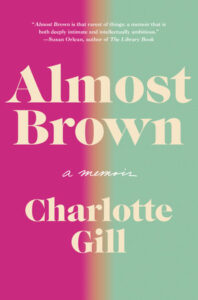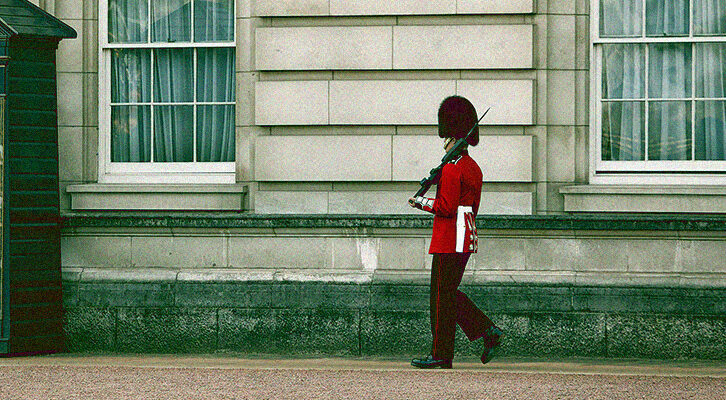As Seen on TV: Charlotte Gill on Adjusting to American Life
“I learned that shame lived in the silence.”
We’d landed as a family in the United States, the Elysian Fields of the immigrant imagination, but in many ways our parents were still creatures of the Old World. Our mother had come from the foggy shores of the English motherland, our dad from the ancestral Indian village. They had few ways of explaining America in all its glittering cultural excess, they were too busy figuring it out for themselves. And so we turned to our favorite educational tool, the TV.
When I was thirteen, I saw Indiana Jones and the Temple of Doom for the first time. In one scene, the swashbuckling Harrison Ford is invited to a lavish dinner by the boymaharaja of Pankot, with many turbaned, bearded guests in attendance. They’re served eyeball soup and chilled monkey brains while women in lehengas gyrate with castanets in the background. Later on in the story, a man’s heart is torn out by an evil Hindu priest, and then he’s lowered into a sacrificial fire—quite a bit of gore for a culture partial to vegetarianism.
In the Temple of Doom days, there were still hardly any actual Indian characters on TV or at the movies, just like there were few deadbeat dads or single moms shedding tears into their Friday-night merlot. There were few divorces until Kramer vs. Kramer, and even then, many parents wouldn’t let their kids watch it, as if the film captured something all too real for depiction, something never narrated in public, let alone shared in a cinema with strangers. I learned that shame lived in the silence.
In many ways our parents were still creatures of the Old World.We saw Gandhi, starring Ben Kingsley in a dhoti, but who really knew what Ben Kingsley was in his shapeshifting demi-darkness Indian? English? A bit of both? When people thought of on-screen Indians, they still remembered Peter Sellers in brownface. In The Party, Sellers plays Hrundi V. Bakshi, a bungling Indian actor with a dippy, faux-subcontinental accent who shows up at a tasteful Hollywood soirée wearing a tan suit, an orange tie, and matching orange socks with white shoes.
Bakshi is cursed with a bum-bling curiosity, utterly unaware of his own silliness. The guests are amused by this runty brown fellow—until Bakshi stumbles through a series of inadvertent gaffes and utterly destroys the event. Hilarious, wasn’t it, the way Indianness fit so well with slapstick?
In the thick of The Party’s disaster, the host demands, “Who do you think you are?”
Bakshi replies with surprising backbone, “In India, we don’t think who we are, we know who we are.”
The shambling middle-aged man with a penchant for loud wardrobe choices, with a paralyzed sense of social awareness and a total exemption from Marlboro Man masculinity. The joke was obviously on my dad. But a defiant form of dignity belied Bakshi’s oblivion. A human paradox. A layered consciousness. This also felt familiar.
On the other hand, I learned a lot about ideal American life from TV, from shows like Family Ties, which featured a monochromatic household with three normal kids and two normal parents. The dad, Steven Keaton, was an ex-hippie public radio station manager whose humbly carefree attitude about his own appearance expressed itself in rumpled plaid shirts, a beard, and shaggy hair. Steven Keaton did not dress like a peacock or wear scent bombs of cologne, and when he drank tea, he did not require royalty-grade tray service complete with a miniature milk pitcher and sugar bowl.
Father Keaton made hot beverages for himself using just a regular tea bag and a plain mug and water poured directly from the kettle. He appeared, despite the light sit-com conflicts, to be unswervingly devoted to his wife and best friend, Elyse. In one episode, he’s faced with a sexy blond co-worker who throws herself at his feet. He may have been tempted, but he possessed enough foresight to realize an affair would obliterate his world from the inside out. He knew there were no true secret compartments in life, no matter how much he might wish for them. Everything—his private self, his work, his family—was connected to everything else.
I gleaned a lot at my friends’ houses, too. Their dads called their kids “sweetheart” and “buddy.” They communicated with their offspring about the minutiae of life just as easily as they played catch with Nerf footballs out on their diagonally mowed lawns. They knew what time school started and who had last walked the dog. They could not be snowed by their kids because they knew every contour and wrinkle of their days. And despite the odd bout of gaslighting applied to their daughters’ emotions, or homophobic hazing used as discipline for their sons, they were mostly kind and devoted, or at least that’s the way they looked to me.
They did the sacrificial grunt work of the patriarchy. They blacktopped their driveways and repaired their own cars and emptied and refilled their aboveground swimming pools every year just so we could cannonball off the decks in the heated days of summer vacation. They ate the bread heels and the charred hot dogs. They drove their daughters to early-morning swim practice, and they sometimes picked me up on the way. They often took me along on their family adventures, my American proxy dads, and in their company, I figured out how to water-ski, how to feed a woodstove, how to sharpen a knife. Sometimes these were overt lessons, but mostly I learned by osmosis.
American fathers conspired with their children against mom directives; they let us eat Pringles before dinner and play hours of Adventure on the rec room Atari. They talked with their kids using a different language than the one mothers used, a kind of semi- violent joshing in which they played the older siblings.
“Don’t worry,” they said, holding pillows to their kids’ faces. “This might only hurt a little bit.”
They sprayed their children with garden hoses and flogged them with the towels left wet on the bathroom floor. They could call their kids smelly or lazy or useless idiots, without meaning it in the slightest; these were terms of endearment. They let their kids razz them, too, and no one’s pride was harmed. North American families looked to me like soft republics in which everyone, even the small people, if they didn’t exactly get a vote, at least they got a lobby. In the dream, everyone’s needs were considered.
__________________________________

Excerpted from Almost Brown: A Memoir by Charlotte Gill. Copyright © 2023. Available from Crown, a division of Penguin Random House, LLC.




















